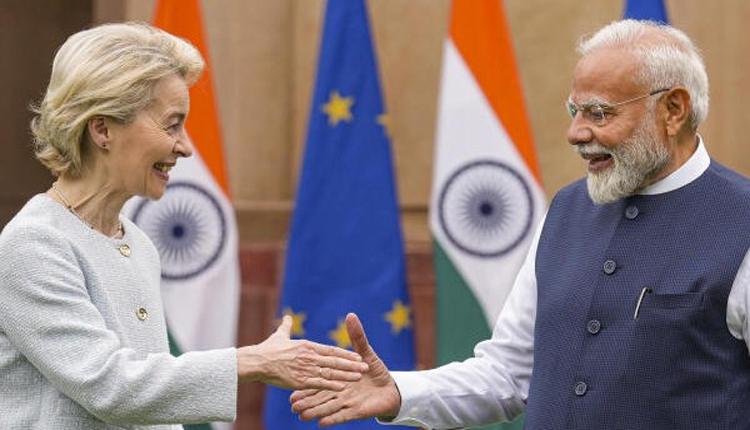New Delhi: European Union leaders have turned to Prime Minister Narendra Modi to leverage India’s growing global influence in efforts to end Russia’s ongoing war in Ukraine, in what is seen an important key outreach.
On September 4, European Commission President Ursula von der Leyen and European Council President António Costa held a joint telephonic conversation with Modi, praising India’s “important role” in pressing Russia to halt its aggression and pave the way for peace. The call, which also focused on deepening India-EU ties, underscores New Delhi’s rising stature as a key player in global diplomacy.
Von der Leyen, in a post on X, lauded India’s continued engagement with Ukrainian President Volodymyr Zelenskyy, stating, “We warmly welcome India’s efforts. India has an important role to play in bringing Russia to end its war of aggression and helping create a path towards peace.” The EU leaders highlighted the war’s far-reaching consequences, noting that it “carries global security implications and undermines economic stability, posing a risk to the entire world.”
Modi’s Diplomatic Balancing Act
India’s nuanced stance on the Russia-Ukraine conflict has positioned it as a potential mediator. Modi reiterated India’s consistent support for a peaceful resolution during the call, emphasising dialogue and diplomacy as the path forward. This aligns with his recent diplomatic engagements, including a historic visit to Kyiv on August 23, 2024, where he met Zelenskyy and offered India’s proactive contribution to peace efforts. During that visit, Modi underscored, “India was never neutral in this war; we side with peace,” while paying tributes to children killed in Russian strikes.
The EU’s appeal comes on the heels of Modi’s meetings with Russian President Vladimir Putin and Chinese President Xi Jinping at the Shanghai Cooperation Organisation (SCO) summit in Tianjin, where discussions on Ukraine featured prominently. India’s participation in the Ukraine-led peace summit in Switzerland in June 2024 further signaled its commitment to a rules-based global order, with Modi and Zelenskyy jointly affirming respect for territorial integrity and sovereignty.
Strengthening India-EU Strategic Partnership
Beyond the Ukraine agenda, the call focused on bolstering the India-EU strategic partnership. Building on the historic visit of the EU College of Commissioners to India in February 2025, Modi invited von der Leyen and Costa to the next India-EU Summit, slated for early 2026. Both sides expressed a commitment to finalising a Free Trade Agreement (FTA) by the end of 2025, with Germany pledging to double bilateral trade. The leaders also discussed a joint strategic agenda to enhance cooperation in trade, technology, defence, and sustainability.
India’s External Affairs Minister S. Jaishankar reinforced this stance in a conversation with his Ukrainian counterpart, Andrii Sybiha, on September 4, reiterating India’s support for an early end to the conflict. The EU’s outreach reflects a broader recognition of India’s diplomatic heft, with von der Leyen noting that the war’s global repercussions necessitate India’s involvement.
A Delicate Geopolitical RoIndia’s engagement with both Russia and Ukraine has drawn attention, particularly amid US criticism over its continued oil imports from Moscow. Despite a 50% tariff imposed by the U.S. on August 27, targeting India’s Russian oil purchases, New Delhi has maintained that its trade is legal and benefits global energy markets. Finance Minister Nirmala Sitharaman’s recent assertion that India will continue buying Russian oil underscores this strategic autonomy.
The EU’s call to Modi signals a shift from Western criticism to collaboration, recognising India’s unique position to join influence Russia. Posts on X reflect mixed sentiments, with some users applauding India’s balanced approach, while others positions India as a pivotal player. With the EU banking on New Delhi’s influence, the world watches to see if India can help chart a path to peace while strengthening its strategic ties with Europe.



Comments are closed.